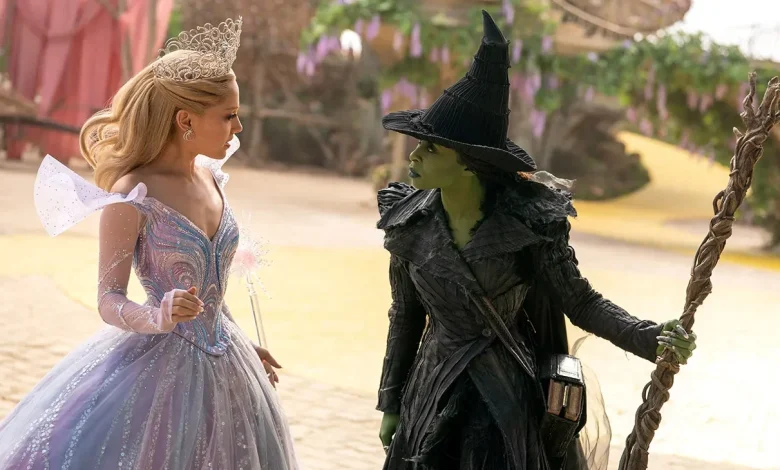‘Wicked: For Good’ Review: Cynthia Erivo Remains Stellar, but a Radiant Ariana Grande Owns the Continuation of Jon M. Chu’s Musical Marathon

The doubts that surfaced when it was first announced that Jon M. Chu’s screen adaptation of Wicked was to be released in two parts are not exactly erased by the two hours-plus of this second installment. But it’s safe to assume the millions of fans who have made the blockbuster stage musical a global phenomenon won’t be complaining. Sure, all but one of the show’s most memorable songs are in the first act, but the investment in character, story and sumptuous design more than compensates in Wicked: For Good, which again shows that casting stellar vocal talents Cynthia Erivo and Ariana Grande was a masterstroke.
Even if the combined two parts totaling almost five hours are a lot, there’s a lovely symmetry to the fact that while the opener very much belonged to Erivo’s misunderstood, green-skinned Oz outcast Elphaba, the follow-up foregrounds her erstwhile nemesis turned friend Glinda, brought to luminous life by Grande.
Wicked: For Good
The Bottom Line
Wickhards will rejoicify.
Release date: Friday, Nov. 21
Cast: Cynthia Erivo, Ariana Grande, Jonathan Bailey, Ethan Slater, Bowen Yang, Marissa Bode, Michelle Yeoh, Jeff Goldblum, Bronwyn James, Sharon D. Clarke, Colman Domingo
Director: Jon M. Chu
Screenwriters: Winnie Holzman, Dana Fox
Rated PG,
2 hours 18 minutes
Make no mistake, Erivo remains a powerhouse, with pipes that shake the heavens and a wellspring of unforced emotional intensity that never runs dry. The paradox is even more apparent that despite Elphaba’s infamy as the so-called Wicked Witch of the West, the inherent kindness and fairness in her opposition to cruel injustices and increasingly authoritarian rule end up being her salvation, albeit while she takes the fall as the story’s scapegoat.
But Grande’s conceited blonde bubblehead gains in stature here as Glinda assumes statesmanlike responsibility to spread goodness in Oz, while experiencing crushing romantic disappointment that humbles her and deflates her vanity.
Grande has been acting since she was a kid, and her quiet moments of introspection, anxiety or sadness show tender depths, as does her loyalty to Elphaba. She reveals plucky strength and resourcefulness to match Elphaba’s unbreakable backbone when she starts seeing through the scheming of Madame Morrible (Michelle Yeoh), who emerges as the real despotic power player — not the empty-vessel Wizard (Jeff Goldblum). He’s a lightweight and he knows it, especially compared to ruthless Morrible.
More than ever, the musical becomes a story of mutually nourishing sisterhood. Glinda’s sorcery may be manufactured rather than a natural gift like Elphaba’s, but her heart is genuine, often seeming to burst out of her chest in crystalline vocals colored by as much vulnerability as sweetness.
When Erivo and Grande, toward the end of For Good, ease into that stirring title song and soar into gorgeous harmonies celebrating the reciprocal rewards of love and support, the young women in the row behind me at a recent press screening started sniffling and sobbing, their tears then flowing on and off through the entire final act. That kind of reaction no doubt connotes intimate familiarity with the material, but the screenplay — by Winnie Holzman and Dana Fox, based on Holzman’s book for the show from the novel by Gregory Maguire — earns its emotions with more sincerity than schmaltz.
Working its way back to the first movie’s opening, in which Glinda descends on Munchkinland in a pseudo-magical (in fact, motorized) bubble to declare a death, the story picks up as the exiled Elphaba’s vilification reaches new heights. Banners painting her as a monster to be feared and loathed hang all over Oz, with Morrible using both witchcraft and plain old propaganda to fuel that narrative.
Elphaba has retreated to a hiding place deep in the forest, but she emerges repeatedly, swooping in on her broom with her voluminous black cape flapping behind her to halt the mistreatment of animals being used as forced labor to construct the Yellow Brick Road.
The demonization of otherness that has become such a staple of the contemporary political landscape has reached its apotheosis, with animals — formerly an integral and respected part of Oz society — now treated as inferior beings, requiring special permits to travel. Munchkin discrimination is not far behind.
Elphaba encounters a large group of animals attempting to flee through the woods to the mysterious “place beyond Oz,” even though it’s rumored to be just emptiness. At least temporarily, she dissuades them from their exodus with one of two new songs written by composer-lyricist Stephen Schwartz for the movie, “No Place Like Home.” Erivo delivers it with inspirational fervor and warmth, even if the number is a generic showtune compared to Wicked’s best-loved bangers.
That forest interlude also introduces the Cowardly Lion (voiced by Colman Domingo), the first of the three beloved sidekicks from The Wizard of Oz, whose origins are outlined here. Holzman and Fox find clever ways to intersect their story with that of the L. Frank Baum novel and the 1939 MGM musical. Dorothy and Toto are glimpsed repeatedly from a distance without ever being fully seen or heard, but the transplanted Kansas farm girl turned shoe thief makes her presence felt in all kinds of meddlesome ways.
Some of the funnier moments involve Grande’s reactions to elements from the timeless Judy Garland vehicle. “I swear, it never ends with that girl,” remarks an exasperated Glinda as Dorothy takes off in a hot-air balloon. And when Elphaba lets loose an unmistakable Margaret Hamilton cackle, Glinda rolls her eyes, asking “What was that?” The biggest connection between the canonical story and this revisionist take is the revelation of plot details pertaining to the tornado that lifted Dorothy’s home out of Kansas and dropped it down in Munchkinland.
The love triangle of Glinda, Elphaba and Fiyero (Jonathan Bailey) — newly appointed captain of the guards assigned by Morrible to hunt down and capture the green pariah — acquires resonant dimensions that fortify all three characters and deepen the performances.
The rise of Elphaba’s resentful sister Nessarose (Marissa Bode) to governor of Oz, which twists her relationship with the munchkin Boq (Ethan Slater), feels a little rushed to flesh out her bitter embrace of the Wicked Witch of the East title. But it serves to explain the existence of the Tin Man, just as later developments usher in the Scarecrow.
Among the supporting performances, Yeoh sinks her teeth into Morrible’s manipulative shadow villainy (though her singing has gotten even worse); Goldblum makes the Wizard a self-serving but somehow charming charlatan, even if no actor is ever going to make an eyebrow-raising late revelation about the character any easier to swallow; Bailey brings new gravitas and honor to Fiyero, downplaying the character’s formerly hedonistic side (and People magazine’s recent coronation of the actor as 2025’s Sexiest Man Alive); Slater taps into a moving vein of sorrow as Boq; and Bode shows a steely side that conflicts painfully with what Nessarose’s heart wants.
As in the first movie, the attention to eye-popping detail in Nathan Crowley’s spectacular production design and Paul Tazewell’s wildly imaginative costumes is key to this disarming confection’s pleasures, captured in an infinite rainbow of colors and gradations of light by Alice Brooks’ cinematography. If the camera whirling around characters in song is overused as a device, it nonetheless fits with the dizzying effect of the material on its most ardent fans. Likewise, the tendency of Chu to overstuff the frame, notably in scenes of pageantry in Oz with needlessly busy choreography filling the margins, is easily forgivable.
The lush orchestrations of Schwartz’s tunes give the movie expansive aural dimensions to match its visuals, and the use of underscoring is superb, picking up musical themes that nod back to the previous film.
The outcome of Elphaba and Glinda, as anyone who has seen the show will know, is bittersweet. But the most illuminating takeaway from For Good is Glinda’s newfound maturity, leadership instincts and even perhaps a burgeoning understanding of magic, its former absence described by Morrible as her “deficiency.”
Glinda has always been secondary to the more complex Elphaba, given that a perky princess adored by everyone in her orbit can’t compare with the dramatic weight of a cruelly persecuted outsider. But without significantly altering the narrative of the stage musical, the filmmakers have leveled the playing field.
Part of that is due to the movie’s other new song, “The Girl in the Bubble.” The number itself, like Elphaba’s “No Place Like Home,” is not top-tier Schwartz but it serves a purpose. Glinda’s song provides intimate access in a moment of personal crisis, as she takes an honest look at her priorities and privilege while locating her moral compass. Grande floods it with so much feeling that it humanizes and enriches the character and, by extension, the whole movie.





